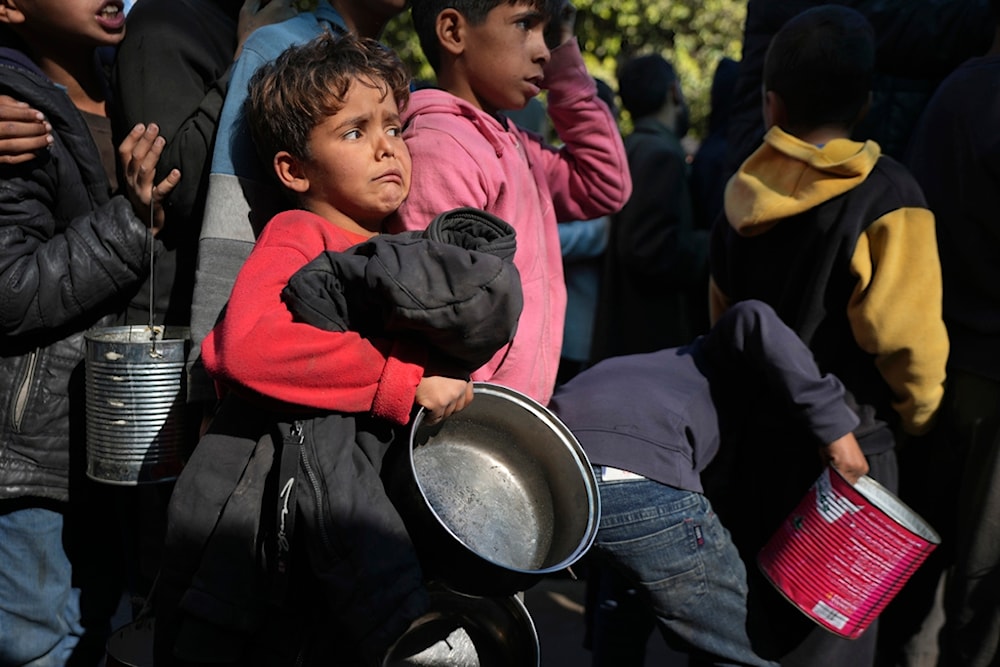UNICEF calls for urgent action as Gaza children endure daily violence
The Executive Director of UNICEF issues an urgent call to "all parties to the conflict, and on those with influence over them, to take decisive action to end the suffering of children."
-

Palestinian children queue for food in Deir al-Balah, Gaza Strip, on Friday, Dec. 13, 2024 (AP)
The Executive Director of UNICEF, Catherine Russell, issued an urgent plea on Friday, highlighting the dire situation faced by children in the Gaza Strip, who endure daily violence and suffering.
“The world cannot look away when so many children are exposed to daily bloodshed, hunger, disease, and cold," Russell stated.
"We urgently call on all parties to the conflict, and on those with influence over them, to take decisive action to end the suffering of children, to release all hostages, to ensure children’s rights are upheld, and to adhere to obligations under international humanitarian law."
Russell referenced the recent Israeli massacre in central Gaza on Thursday, where a "devastating attack" on the Nuseirat camp killed 33 people, including at least eight children.
The UNICEF head highlighted that "the latest violence adds to a staggering figure of more than 160 children reportedly killed in Gaza in a little over a month."
"That is an average of four children every day since the beginning of November," she added.
Over the last 14 months, Russell noted, more than 14,500 children have been reportedly killed in Gaza, and nearly all of the Strip's 1.1 million children are in urgent need of protection and mental health support.
"There is no safe space in Gaza, nor any sense of stability for children, who lack essentials such as food, safe water, medical supplies, and warm clothes as winter temperatures drop,” she underscored.
The Executive Director of UNICEF further warned about the rapid spread of preventable diseases, citing over 800 cases of hepatitis and more than 300 cases of chickenpox.
Earlier on Saturday, the Health Ministry in Gaza confirmed in its daily report that the number of Palestinians killed since the start of the Israeli war on the Strip has risen to 44,930 martyrs, and those injured 106,624.
It noted that a number of victims remain trapped under the rubble and on the streets, as ambulance and civil defense teams are unable to reach them.
96% of Gaza children feel death is imminent, study reveals
A recent study examining children enduring the war in Gaza has revealed that 96% feel their death is imminent, while nearly half express a desire to die due to the trauma they have endured, The Guardian reported.
A needs assessment, conducted by a Gaza-based NGO with support from the War Child Alliance charity, also found that 92% of surveyed children are “not accepting of reality,” 79% experience nightmares, and 73% display signs of aggression.
“This report lays bare that Gaza is one of the most horrifying places in the world to be a child,” said Helen Pattinson, chief executive of War Child UK.
“Alongside the leveling of hospitals, schools, and homes, a trail of psychological destruction has caused wounds unseen but no less destructive on children who hold no responsibility for this war," she added.
Conducted in June this year, the survey included responses from parents or caregivers of 504 children from families where at least one child is disabled, injured, or unaccompanied. The sample was divided between northern and southern Gaza and supplemented with detailed interviews.
The psychological survey, released on Wednesday, was conducted by the Community Training Centre for Crisis Management, a Gaza-based organization, with support from the Dutch Relief Alliance and the War Child Alliance.
The report underscored that “the psychological toll on children was severe, with high levels of stress manifested in symptoms such as fear, anxiety, sleep disturbances, nightmares, nail-biting, difficulty concentrating and social withdrawal.”
It explained that “children have witnessed the bombing of their homes and schools, experienced the loss of loved ones, and have been displaced or separated from their families while fleeing for safety.”
Approximately 1.9 million Palestinians in Gaza—about 90% of the population—have been displaced, many multiple times. Half of this number are children who have lost their homes and been forced to flee their communities.
More than 60% of the children surveyed reported experiencing traumatic events during the war, with many exposed to multiple traumatic incidents.
An estimated 17,000 children in Gaza are unaccompanied, having been separated from their parents, though the report suggests the actual number may be much higher.
“Being separated from their families places these children at a heightened risk of exploitation, abuse, and other serious violations of their rights,” the report cautioned.
It added that “as a result of such exposure, children develop responses that may persist long after the war has ceased, profoundly affecting their daily lives.”
“Traumatic responses can manifest in various ways, including ongoing emotional distress, anxiety, behavioral changes, difficulties in relationships, regression, nightmares, sleep disturbances, eating issues, and physical symptoms such as pain.”
Almost all (96%) feel their death is imminent, while 49% actively wish for death—a sentiment more common among boys (72%) than girls (26%).
War Child has reported that it and its partners have reached 17,000 children in Gaza with mental health support thus far, aiming to extend this aid to one million children in what the charity describes as the largest humanitarian effort in its 30-year history.
“The international community must act now before the child mental health catastrophe we are witnessing embeds itself into multigenerational trauma, the consequences of which the region will be dealing with for decades to come,” Pattinson underlined.
Read more: Gaza war 'most destructive, fatal conflict' in 21st century: Airwars

 5 Min Read
5 Min Read










